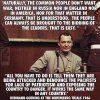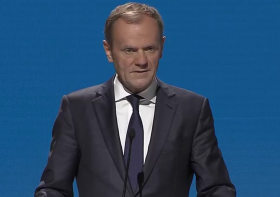Why this myth again? Of course we are free to trade with the rest of the world as an EU member, Germany does it very successfully, how do you think Mercs, BMWs, Bosch products and Siemens trains get everywhere?
We are just not very good at it, making our prospects out of the EU rather dismal.
.
.
Try this from Peter Lilley MP
Trade and the Single Market are key referendum issues yet I am the only MP with first-hand experience of either. Sadly, when politicians debate issues of which they have no experience they seize on any plausible argument which supports their case, even arguments that are the reverse of the truth.
Let me bring some facts to bear on claims made by those who
want us to remain in the EU.
How important are trade deals? It pains me to admit – their importance is grossly exaggerated. Countries succeed, with or without trade deals, if they produce goods and services other countries want.
Tariffs between developed countries now average low single figures – small beer compared with recent movements in exchange rates. The most worthwhile trade agreements are with fast-growing developing countries which still have high tariffs.
Is our net £10 billion contribution to the EU a price worth paying for tariff-free access to the EU market? If we left the EU with no trade deal – inconceivable given the tariff-free zone from Iceland to Turkey – our exports would face EU tariffs averaging just 2.4 per cent.
But our net contribution to the EU budget is equivalent to a 7 per cent tariff. Paying 7 cent to avoid 2.4 per cent costs is miss-selling that dwarfs the PPI scandal!
Does EU membership help us negotiate free trade deals with the rest of the world? Tariff-free access to the fast growing, protected markets of Asia, Africa and Latin America would be worthwhile. Unfortunately, EU membership prevents us negotiating free trade deals – and the EU has negotiated few deals for us: none with China, India, Australia, Brazil.
Does the EU’s size mean it gets better deals than we could alone? This is the reverse of the truth. The more countries involved in a trade deal the harder, slower and worse the result.
All 28 EU members have a veto on their negotiations which is why EU deals take so long and exclude so much. Bilateral deals are simpler, quicker and more comprehensive.
Hence Chile has deals covering countries with collective GDP five times the EU’s deals. Even Iceland – population less than Croydon – has a trade agreement with China – as does Switzerland. w26
Would Britain have to renegotiate from scratch the EU’s existing trade deals? Under the “principle of continuity” in international law we can adapt existing EU treaties to the UK. We should start that process before leaving the EU.
Would negotiating continued free trade with the EU take many years? Trade deals to remove tariffs involve complex trade-offs between differing tariffs on thousands of products and facing up to the vested interests they protect.
Negotiating continuing tariff-free trade between the UK and EU simply means keeping zero tariffs.
Do only European Economic Area members have access to the Single Market? The Single Market is talked about as if it were some inner sanctum accessible to a privileged few.
In fact, every country has access to the Single Market – with or without tariffs.
The Single Market, involved harmonising product rules – sensible, since businesses can now make one product range for the European market, not 28. But that benefits American and Japanese exporters as much as German or British firms.
People assume Britain benefits from participating in setting these rules. But rules provide a framework within which all companies operate – not an advantage to any individual country.
Britain set the rules of tennis but rarely wins Wimbledon. British exports to the EU have grown less rapidly since the Single Market than they did before, less than our partners’ and much less than non-EU countries’ exports!
Maybe that is partly because we suffer EU regulations on 100 per cent of our companies whereas non-EU firms need only comply with EU regulations on activities carried out within the EU.
Our shops are full of goods from countries with which we have no trade deal. They are not essential now tariffs between developed countries are so low.
But outside the EU we will be able to negotiate speedily the really worthwhile deals to access fast growing protected markets such as China, India and Brazil which the EU has ignored.
And we can retain free trade with the EU without paying our current entry fee which costs more than the tariffs we avoid.
Peter Lilley MP was Secretary of State for Trade and Industry 1990-92



